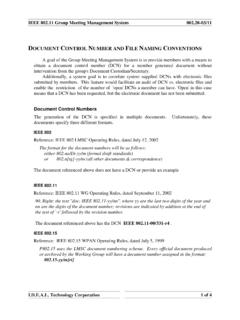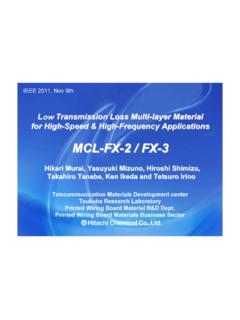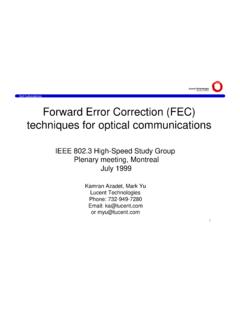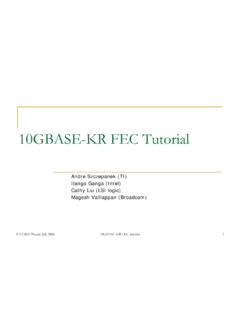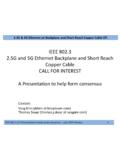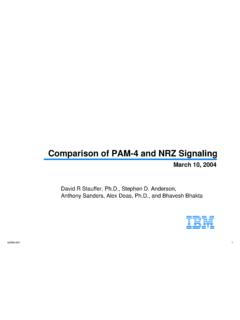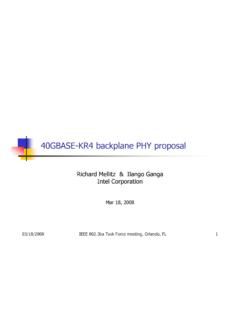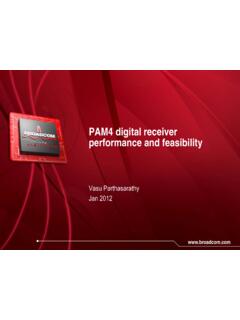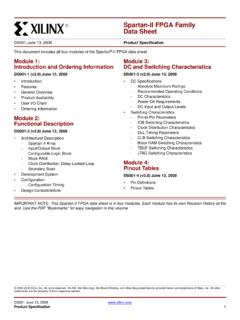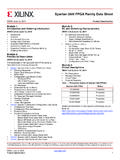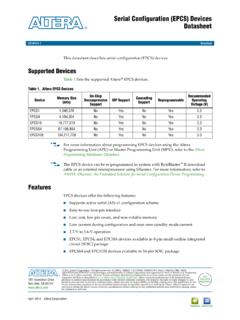Transcription of OIF’s CEI-XSR-56G-NRZ a candidate C2EO CDAUI-8
1 OIF S CEI-XSR-56G-NRZ A candidate C2EO CDAUI-8 Graeme Boyd For IEEE , March 2015, Berlin Contributors and supporters Contributors: Graeme Boyd PMCS Ali Ghiasi Ghiasi-Quantum Piers Dawe Mellanox Supporters: Tony Zortea PMCS Haoli Qian Credo Jeff Twombly Credo Bill Brennan Credo Scott Irwin MoSys Tom Palkert MoSys Mike Dudek QLogic IEEE Mar 2015 Berlin 2 OIF s CEI-XSR-56G-NRZ a candidate C2EO CDAUI-8 Introduction "Proposal for LPPI"* proposes a C2EO or LPPI, with 50 mm or " reach across a PCB, with ball-to-ball insertion loss of 4 dB at 14 GHz or 8 dB at 28 GHz.
2 This could be used as a PMD service interface It is distinct from the higher loss C2M and C2C CDAUI-8 Slide 12 of "Big Ticket Items" has actions for LPPI: C2C and C2M interaction across the 3 reaches Refine proposal and build consensus This presentation describes a suitable specification whose development is well under way, that could be used to refine the LPPI proposal * More references on slide 11 IEEE Mar 2015 Berlin OIF s CEI-XSR-56G-NRZ a candidate C2EO CDAUI-8 3 Motivation An chip-to-chip interface operating at Gbps that is optimized for minimum power consumption.
3 To facilitate an efficient interface to a board mounted optical engine 8 dB insertion loss at GHz (5 to 7 cm of current generation PCB materials) To allow much higher face-plate optical densities compared to using modules To allow lower power for the same bit rate compared to using modules Be forward looking when newer PCB materials allow a 10 to 12 cm reach for an 8 dB insertion loss, for lower module interface power Also for an efficient interface to a separate backplane driver IC to a "shim" chip, which fulfils a similar function to an optical engine Also can be used for low pin count memory interface IEEE Mar 2015 Berlin OIF s CEI-XSR-56G-NRZ a candidate C2EO CDAUI-8 4 The CEI-56G family OIF equivalent Coding Loss @ 15 GHz Loss @ 28 GHz Length (cm) Connectors Relies on FEC?
4 USR NRZ - 2 1 None No XSR Chip-to-EO CDAUI-8 or "LPPI*" NRZ - 8 5-7 None No PAM4 - 5 VSR C2M CDAUI-8 NRZ - 15-18 10-15 1 Optional PAM4 11 - 15 Yes MR C2C CDAUI-8 NRZ - ~38 50 Up to 1 Yes PAM4 20 - LR TBD 35 dB at 14 - "full-sized backplane" Up to 2 Likely * Proposal for LPPI, goergen_3bs_02_1114 (showing an unretimed interface like nPPI) All members of the OIF CEI-56G family assume retiming at either end XSR and USR use radically lower power clocking arrangements than the others See slide 11 for more references IEEE Mar 2015 Berlin 5 OIF s CEI-XSR-56G-NRZ a candidate C2EO CDAUI-8 400 GbE capable systems Systems based on CFP2 (8x50G) will deliver the same capacity as QSFP28 linecards ( Tb/s) CFP2 belly to belly is not viable for blade systems 400 GbE implementations based on board mounted optical engine (PICs)
5 Could double the line card capacity to Tb/s IEEE Mar 2015 Berlin OIF s CEI-XSR-56G-NRZ a candidate C2EO CDAUI-8 6 Port ASIC CFP2 8x50G Fabric ASIC Fabric ASIC CDAUI8 C2M 100G-KR4 A 400 GbE early implementation Port FPGA CFP2 8x50G CDAUI8 C2M 100G-KR4 4xCAUI4 Port Mux Another 400 GbE early implementation Another 400 GbE implementation with PIC Port ASIC PIC MTP PIC XSR XSR 400G-KR4? 8? 400 GbE implementation with PIC Port ASIC PIC MTP XSR XSR Backplane driver (shim) Comparing with other links 56G-XSR-NRZ / cdaui C2EO or LPPI (5-7 cm): 8 dB @ 28 GHz, no connector, no caps Newer materials (Tachyon/Meg7) getting close to 10-12 cm No Tx Emphasis required, 300 to 400 mVppd launch Lower power/area Common clock (sync), no clock recovery (simpler recovery) Removes jitter tolerance testing, some power/area saving 10-15 BER without FEC Lower power/latency/area compared to links that require FEC Fixed CTLE Lower power/area compared to links that require adaptable CTLE 56G-VSR / cdaui C2M (10-15cm) NRZ: 15-18 dB @ 28 GHz, FEC optional to get 10-15 BER PAM4.
6 11 dB @ 15 GHz, FEC required to get 10-15 BER Connector + caps required Async clock recovery Tx emphasis likely needed, ~600/800 to 900 mVppd launch Adaptable CTLE required IEEE Mar 2015 Berlin OIF s CEI-XSR-56G-NRZ a candidate C2EO CDAUI-8 7 56G XSR vs. VSR XSR VSR Modulation NRZ PAM4 NRZ PAM4 Common reference clock Yes, 1/64 No No Needs FEC? BER No, spec 1e-15, measure 1e-12 No Yes Yes, 1e-6 pre FEC Tx Vpkpk 300 to 400 400 to 600 600 to 900 800 to 900 Tx emphasis No Unspecified Connector No Yes Coupling DC AC Rx equaliser Unspecified Yes CTLE and DFE Yes CTLE Yes CTLE IEEE Mar 2015 Berlin OIF s CEI-XSR-56G-NRZ a candidate C2EO CDAUI-8 8 Aggressive simplification for reduced power consumption on the left CEI-XSR-56G-NRZ status Finished second straw ballot First ballot had 44 technical comments Several big ticket items were resolved Second ballot had 32 technical comments Single big ticket item left to be resolved The common clock
7 Architecture Next OIF meeting is 20-24 Apr Principal Member ballot likely Q1 2016 IEEE Mar 2015 Berlin OIF s CEI-XSR-56G-NRZ a candidate C2EO CDAUI-8 9 Summary XSR (LPPI/ cdaui C2EO) is an optimized-power link intended for up to 8 dB of channel loss Quite different from VSR ( cdaui C2M) Minimum power is essential, therefore NRZ, no equalizers, almost no clock recovery XSR's place relates to card architectures, ASIC design and whether any future backplane Ethernet SerDes can fit in the ASIC CEI-XSR-56G-NRZ is a very good candidate for a very low power CDAUI-8 for chip-to-optical engine or chip-to-shim use Can be used to refine the "Proposal for LPPI" IEEE Mar 2015 Berlin OIF s CEI-XSR-56G-NRZ a candidate C2EO CDAUI-8 10 References Joel Goergen and Vasu Parthasarathy, Proposal for LPPI, Big Ticket Items for , January 2015 Interim Meeting.
8 CEI-56G-USR CEI-56G-XSR-NRZ CEI-56G-XSR-PAM4 CEI-56G-VSR-NRZ CEI-56G-VSR-PAM4 CEI-56G-MR-PAM4 CEI-56G-MR-NRZ All the above will be provided to by liaison. Six previous drafts , , , , and are available from and , Common Electrical I/O (CEI) - Electrical and Jitter Interoperability agreements for 6G+ bps, 11G+ bps and 25G+ bps I/O, IEEE Mar 2015 Berlin OIF s CEI-XSR-56G-NRZ a candidate C2EO CDAUI-8 11 QUESTIONS? IEEE Mar 2015 Berlin 12 OIF s CEI-XSR-56G-NRZ a candidate C2EO CDAUI-8

